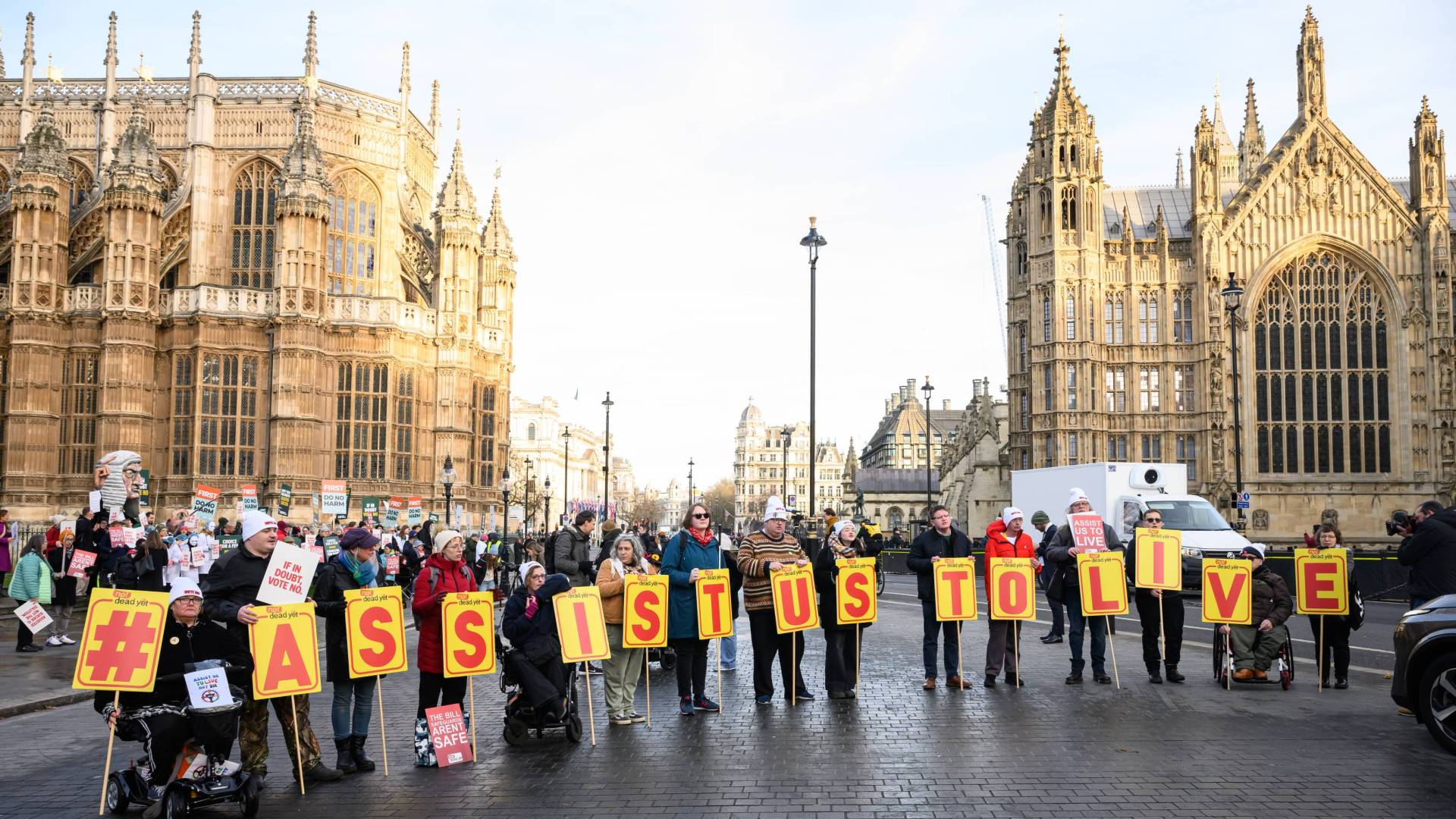In its first major case on transgender issues, the US Supreme Court seems poised to uphold state restrictions on medical transition for youth.
Dozens of protestors gathered on the steps of the court Wednesday as justices heard arguments in United States v. Skrmetti, a dispute over a Tennessee state law that bans minors from receiving medical treatment to facilitate transitioning, primarily certain puberty blockers and hormones. (The law also bars surgery, but that aspect is not in consideration before the court.)
Those in favor of the ban—and similar laws in 26 states—held signs with slogans like “Do No Harm” and “Kids’ Health Matters.”
Among them were evangelical organizations, including staff from the Southern Baptist Convention’s Ethics and Religious Liberty Commission (ERLC), which ranked opposing gender transition surgeries and other medical procedures on minors as one of its top policy focuses of 2024.
“It was inevitable that [the Supreme Court] was going to take a case like this, because of the prominence of the issue,” David French, a New York Times columnist and former attorney who worked on religious-freedom issues, told Christianity Today. “There are times when the court weighs in simply when the issue is important enough for the court to decide.”
After the law—Tennessee’s Senate Bill 1—was signed in March, the American Civil Liberties Union of Tennessee and other organizations sued the state on behalf of three families to block the ban. They have argued that the law is unconstitutional and discriminates on the basis of sex, while the state countered that it regulates medical treatment for all minors and that the dividing line is based on age and usage, not sex.
In the spring, a federal judge blocked part of the law in district court, and then the decision was reversed on appeal. In June, the Supreme Court agreed to hear the case.
During oral arguments Wednesday, the high court’s 6–3 conservative majority at times sounded reluctant to wade into the arena, raising the possibility that they will take a more hands-off approach in their verdict that may allow the state’s position to stand. Conservative justices questioned whether there is enough conclusive medical research on the long-term impacts of such treatments.
Christians concerned about gender transition of minors expressed concerns to the Supreme Court both about the theological implications of rejecting a person’s biological sex and about the health risks that the medical treatments carry.
The case “implicates fundamental truths that Southern Baptists hold dear,” wrote the ERLC in an amicus brief filed along with the Tennessee Baptist Mission Board, which represents over 3,000 churches.
They told the Supreme Court that they “have an interest in ensuring that governments protect children’s developing healthy bodies, including by prohibiting medical procedures that refashion healthy bodies based on the children’s perceived or desired gender.”
Echoing some of the justices, the Southern Baptists argued that not enough is known about “the actual long-term effects of ‘pausing’ puberty” to conclude that such interventions are safe.
Chief Justice John Roberts, a George W. Bush appointee, referenced an independent review from the United Kingdom that found insufficient evidence around the efficacy of transitioning treatments for minors, which caused England’s National Health Service to stop prescribing youth puberty blockers or certain hormone treatments until a certain age is reached.
“If it’s evolving like that and changing, and England’s pulling back, and Sweden’s pulling back, it strikes me as a pretty heavy yellow light, if not red light, for this court,” Justice Brett Kavanaugh, a Trump appointee, said. He also asked whether such questions are better decided by the legislative rather than the judicial branch.
Roberts agreed: “My understanding is that the Constitution leaves that question to the people’s representatives rather than to nine people, none of whom is a doctor.”
US Solicitor General Elizabeth Prelogar suggested the court doesn’t need to overturn the law, and it could send the case back to the lower courts for further scrutiny over Tennessee’s justification for the ban. She argued lawmakers singled out certain groups of children unlawfully in violation of equal-protection claims by drawing “sex-based lines.”
Prelogar also said ruling for the plaintiffs would not necessarily mean all state laws would be struck down: She brought up how treatments in the UK and Sweden are restricted but not banned outright and how other states have restrictions that still allow hormones and puberty blockers—West Virginia requires two doctors to diagnose a patient with gender dysphoria if the patient is under 18.
Meanwhile, the court’s liberal minority compared the state bans on treatment for youth to past laws that discriminated based on race or gender.
Justice Sonia Sotomayor, an Obama appointee, argued that “every medical treatment has risks” and was skeptical of Tennessee Solicitor General Matthew Rice’s arguments that the case did not represent sex discrimination. “It is a dodge to say, this is not based on sex, it’s based on a medical purpose, when the medical purpose is utterly and entirely about sex,” she said.
While this case is the first to reach the high court, similar controversies are bubbling up in other states, with different legislatures taking sharply different approaches to the issue.
The 8th US Circuit Court of Appeals blocked a similar state ban going into effect in Arkansas. But the 6th and 11th circuits upheld similar state laws in Tennessee, Kentucky, Alabama, and Florida. At least 17 states have passed “shield” or “refuge” laws or have executive orders focused on protecting medical providers or families seeking access to these treatments.
The Williams Institute of the UCLA School of Law estimates that around 1.6 million adults identify as transgender. Among youth ages 13 to 17, around 300,000 identify as transgender.
The Christian Medical and Dental Associations opposes any interventions intended as sex reassignment, including hormones for children or adolescents.
French said he expects the court to rule in favor of the ban since states have long asserted a “zone of protection over children,” restricting certain risky or harmful activities even if parents approve, such as laws regulating getting tattoos or piercings and age-of-consent laws.
“I don’t think it is all that predictable how the court will come out here, although I do expect them to uphold the Tennessee law,” he said.
On the chance that the Supreme Court rules against Tennessee’s ban, similar bans in other states could be overturned by lawsuits or declared unconstitutional.
A ruling in favor of the state may mean a more federalist posture, allowing states to adopt differing levels of restrictions around transgender youth, similar to the country’s patchwork of abortion laws. The families argue that an adverse ruling would “effectively immunize all forms of government discrimination against transgender people from meaningful constitutional scrutiny.”
One thing that will change before a decision is reached is the position of the federal government on the case. The incoming Trump administration is expected to side with the state’s view that the bans are constitutional. The switch may mean some legal shuffling for the Supreme Court but is not expected to impact the justices’ ruling.
A decision is expected by late June or early July 2025.

























































































